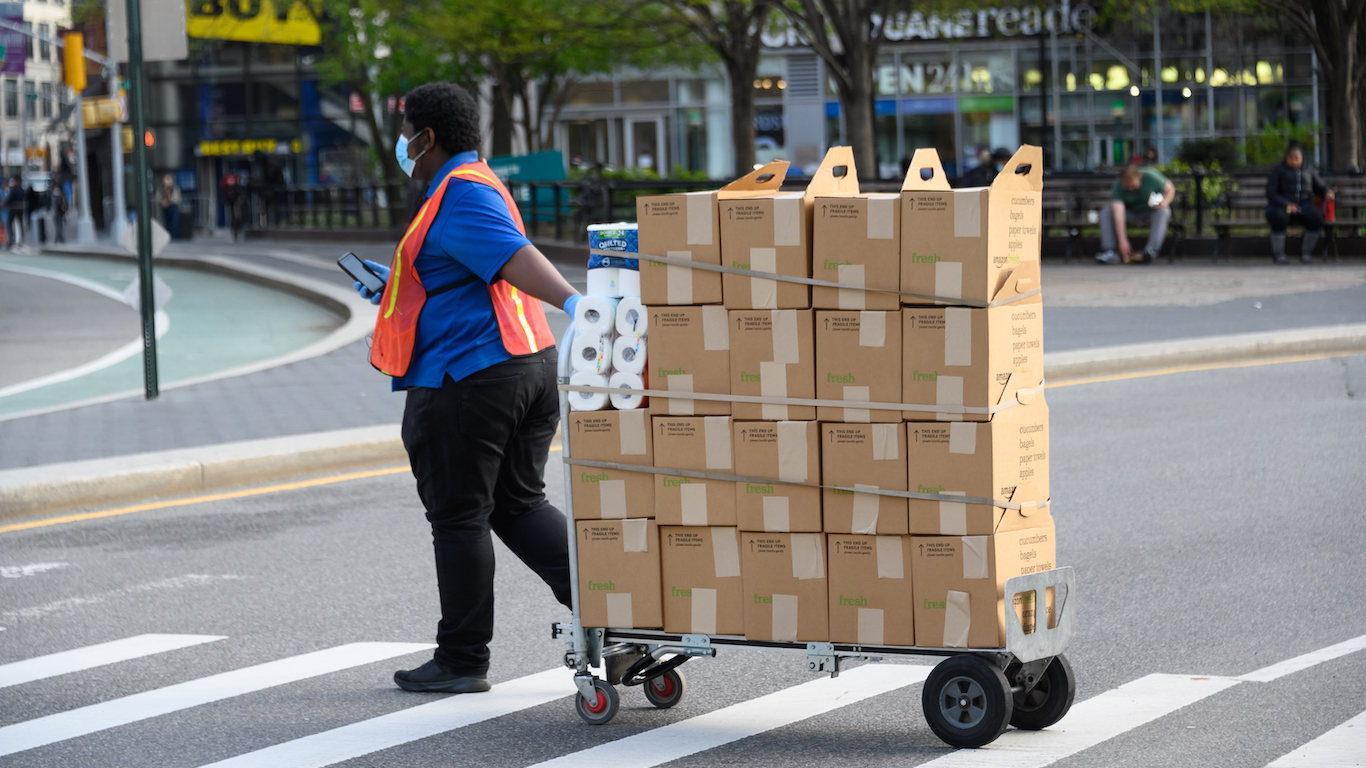
Amazon (NASDAQ: AMZN) has been perhaps the biggest beneficiary of the coronavirus pandemic. Amazon stock is currently trading at all-time highs, leading the S&P 500 and the stock market in general in this recovery.
Wall Street fell in love with Amazon because of its ability to take over industries; some analysts even called it the “Death Star.” This nickname fits, despite the fact that Amazon is providing much-needed services that keep this country — or at least the millions of households who depend on its delivery service — going.
However, Amazon is more than just its delivery service or Amazon Web Services (AWS). It also has a host of product offerings that compete with the likes of Apple (NASDAQ: AAPL), Alphabet (NASDAQ: GOOGL) and Microsoft (NASDAQ: MSFT).
Even though Amazon may not have the largest market share in the consumer electronics segment, it’s still a fierce competitor with new and better offerings each year. Also other niche markets are proving to be more competitive than once thought.
On Fire
Amazon recently announced the next generation of its Fire HD 8 tablet family, including the all new Fire HD 8, Fire HD 8 Plus and Fire HD Kids Edition. These will be directly competing with the iPad, Galaxy Tab and Microsoft Surface. In terms of the price points, the Fire HD 8 family is the cheapest on the market — advantage Amazon here.
Looking at the competition, the Samsung Galaxy Tab comes in at $650+, the Microsoft Surface Go at $400+, and the Apple iPad Air 3 at $500+. The Fire HD 8 vastly undercuts all of these, starting at $90.
The base features for the Fire HD 8 include 32GB of internal storage, up to 12 hours of battery life, and USB-C charging. There are options for 32GB or 64GB, and the tablet can support up to 1TB of expandable storage via microSD.
In terms of processing, Amazon claims the base model is now 30% faster with a 2.0 GHz quad-core processor and 2GB of RAM.
The Kids Edition does not differ too much from the base model other than the “kid-proof” case. It comes with a two-year subscription to the Amazon FreeTime Unlimited service so youngsters can explore educational content on the device.
Shipping of these products begins on June 3.
The Case for Hipster Amazon
Amazon has never been scared of the competition, and in many cases the company embraces it by taking over new industries. This is especially clear with its Fire HD 8 family of products. However, there has been one industry that has been giving Amazon trouble.
Etsy (NASDAQ: ETSY) has been the go-to e-commerce site for artisan and handmade goods for years now. Amazon tried to break into the handmade marketplace in 2015, but Etsy had the first-mover advantage.
While Amazon is the dominant force in online shopping, Etsy has carved out a niche in the handmade goods space. If anything, Etsy is like a hipster version of Amazon and there is apparently a big market for that.
Both of these companies have garnered large followings, although Amazon’s dwarfs Etsy’s. Regardless, both have earned a premium valuation while sharing a similar space.
It appears that Hipster Amazon (Etsy) will continue to dominate this niche market, at least until Amazon makes more acquisitions to compete.
The long and short of this is that if Amazon had moved into artisanal goods before it was cool, the case for Etsy would be much weaker now.
Death Star Status
Amazon is capable of making these moves and destroying whole industries because it has solid fundamentals, and these come from solid earnings.
In its most recent earnings report, Amazon said it had $5.01 in earnings per share (EPS) and $75.5 billion in revenue, compared with consensus estimates that called for $6.25 in EPS and $73.6 billion in revenue. In the same period last year, Amazon reported $7.09 in EPS and $59.70 billion in revenue.
At the same time, AWS revenues increased 32.8% to $10.22 billion, up from $7.70 billion in the same period last year, with operating profit of $3.08 billion. AWS helps power the Amazon machine. Even if the company loses money on its delivery service, this is offset by the revenue and margins in AWS.
Looking ahead to the second quarter ending in June, the company expects to see net sales in the range of $75 billion to $81 billion, and operating income ranging from a loss of $1.5 billion to a profit of $1.5 billion.
With its stock at an all-time high and sales growing at this rate, it’s hard to argue against Amazon as the “Death Star.”
Credit card companies are handing out rewards and benefits to win the best customers. A good cash back card can be worth thousands of dollars a year in free money, not to mention other perks like travel, insurance, and access to fancy lounges. See our top picks for the best credit cards today. You won’t want to miss some of these offers.
Flywheel Publishing has partnered with CardRatings for our coverage of credit card products. Flywheel Publishing and CardRatings may receive a commission from card issuers.
Thank you for reading! Have some feedback for us?
Contact the 24/7 Wall St. editorial team.

